All products featured are independently chosen by us. However, SoundGuys may receive a commission on orders placed through its retail links. See our ethics statement.
Beats Studio3 Wireless vs Bose QuietComfort 45
Published onAugust 22, 2024

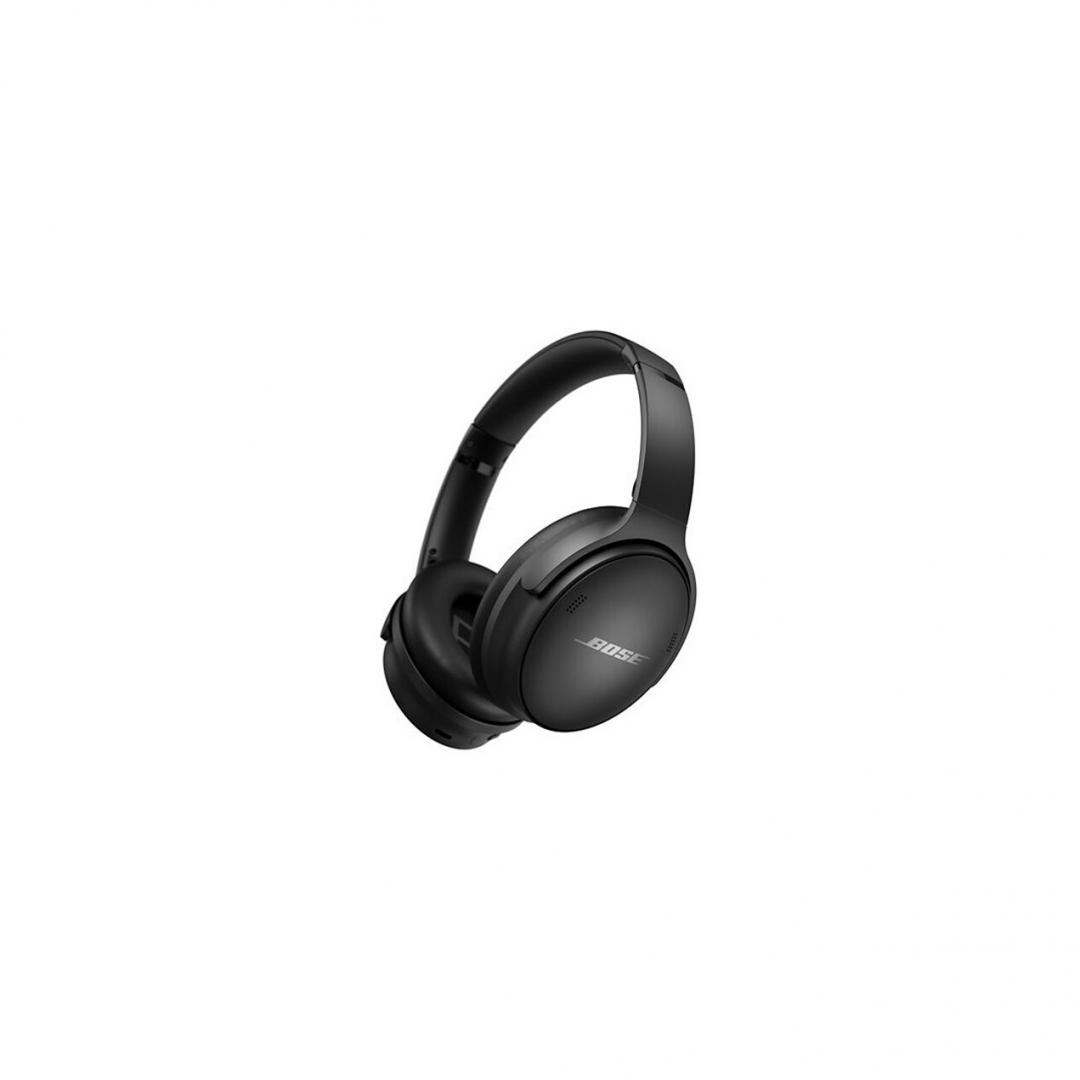

The Bose QuietComfort 45 is the company’s latest attempt to conquer the active noise canceling (ANC) headphones niche. Excellent ANC, great design, and impressive battery life command a hefty price tag. If you’re looking for a good deal and loud bass, you might be wondering how the Beats Studio3 Wireless stacks up against the Bose QuietComfort 45.
Released in late 2017, the Beats Studio3 Wireless is now available at a significant discount. Let’s see whether you should consider it over the competition.
Editor’s note: this versus article was updated on August 22, 2024, to answer an additional FAQ and update formatting.
Beats Studio3 Wireless vs Bose QuietComfort 45: Which headset has the better design?
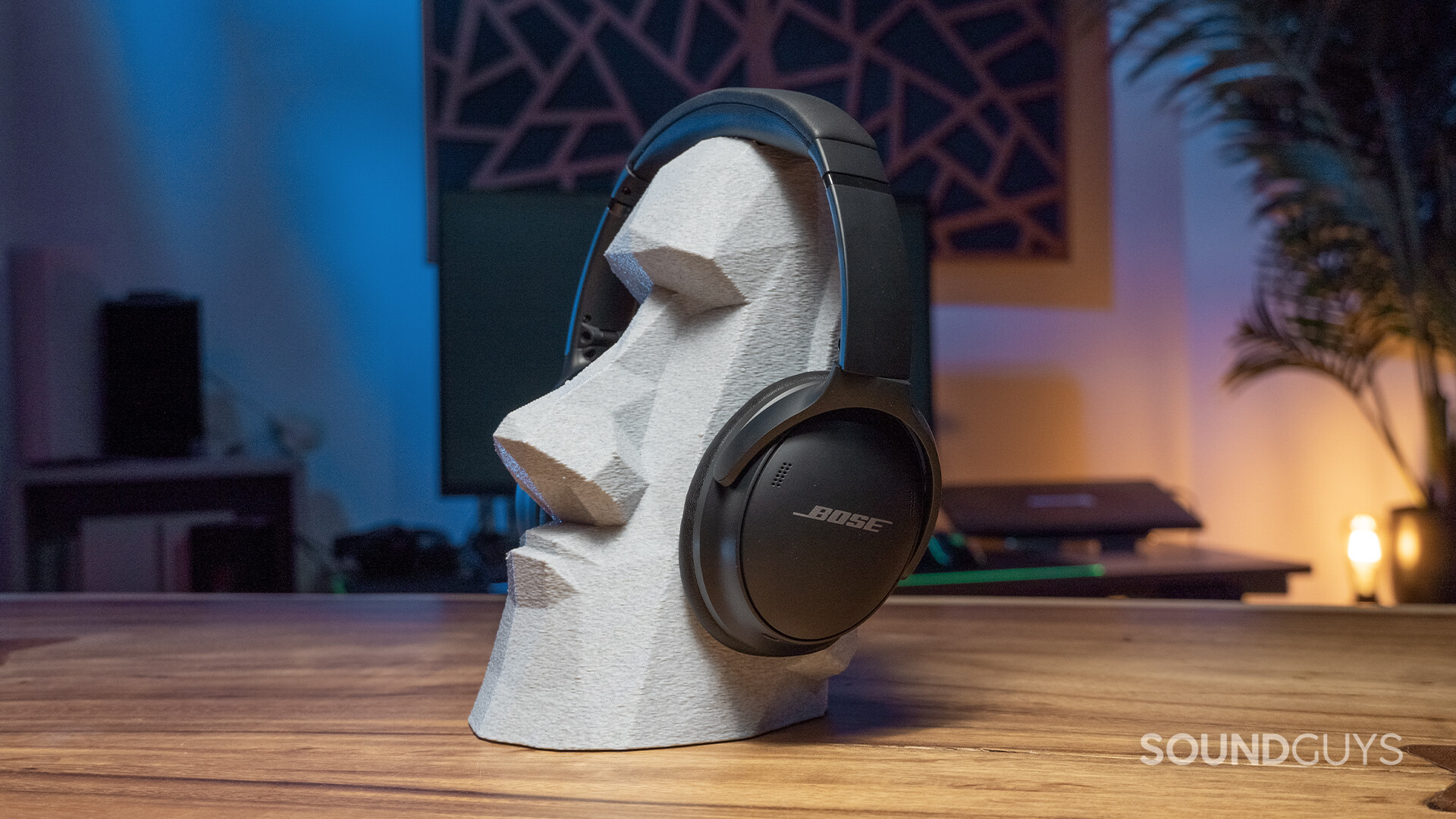
True to its name, the Bose QuietComfort 45 is comfortable to wear for many hours. Bose went with a classic black design featuring a plastic build, large synthetic leather ear pads, and a padded headband. Given its over-ear footprint, the headset is fairly light at 260 grams.
The Beats Studio3 Wireless has an impressive finish with its soft, matte plastic that’s smooth to the touch. While the ear pads are comfortable, your ears might get hot after a few hours. The headband lacks padding, and the plastic might stick to your hair. At 260 grams, it’s a bit heavier than the Bose headset. On the bright side, you can choose from a range of colors in addition to black.
![Beats Studio3 Wireless[9] If the ear cups would only rotate 90 degrees then they'd be ideal for travel.](https://www.soundguys.com/wp-content/uploads/2018/02/Beats-Studio3-Wireless9.jpg)
The BoseQuiet Comfort 45 is incredibly flexible, with rotating hinges for each ear cup and a folding mechanism that lets you pack it down into a super compact shape. The Beats Studio3 Wireless also folds down, but not quite as nicely. Notably, the Beats ear cups don’t rotate, so it may feel awkward to wear these headphones around your neck. We also don’t put much trust in its durability as the Studio3 Wireless headband is much more rigid than its Bose counterpart.
Both headphones carry the power button on the right ear cup. The Beats logo on the left ear cup is a button that controls playback, and to toggle the volume, use the buttons above and below the Beats logo button. Bose added a multi-function button to the rim of the right ear cup; it controls playback, volume, and calls. The Action button on the left side toggles ANC mode, activates the voice assistant, and mutes calls.
Does the Beats Studio3 Wireless or the Bose QuietComfort 45 have better features?
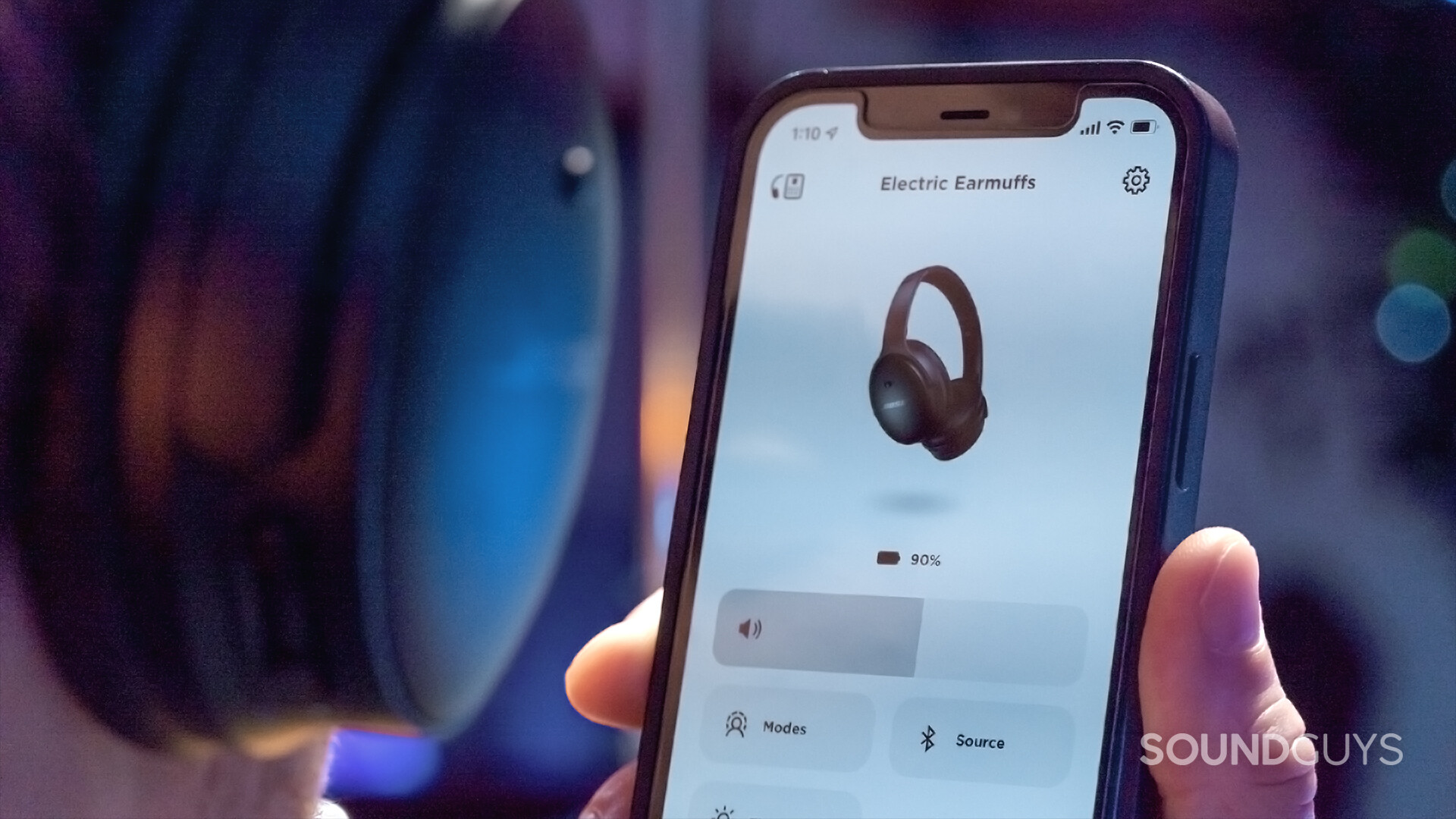
Both Beats and Bose offer apps for their headphones. When you use the Beats Studio3 Wireless on an iPhone, you can use the iOS Settings app. Android owners, however, need to download the Beats app to rename the Beats and check its charge level. The Beats app can toggle ANC on or off, but it doesn’t feature an EQ. Bose, on the other hand, updated its Music app to add an EQ, meaning you can now adjust your headphones’ sound profile to your preferences.
Speaking of ANC, let’s discuss your options here. The Bose QuietComfort 45 doesn’t let you turn ANC off unless you power off and use the headphones in wired mode. You can, however, switch from Quiet to Aware Mode, which lets some outside sounds pass through. The Beats Studio3 Wireless offers two ways to turn off the ANC: double-click the power button, enter Bluetooth settings (iOS), or use the Beats app (Android).
Does the Bose QC 45 have better battery life than the Beats Studio3 Wireless?
![Beats Studio3 Wireless[6] Curiously, there's no USB Type-C or even a lightning port on the Beats Studio3 Wireless.](https://www.soundguys.com/wp-content/uploads/2018/02/Beats-Studio3-Wireless6.jpg)
Beats promises a battery life of 22 hours with ANC turned on and 40 hours if you turn noise canceling off. In our tests, the Beats Studio3 Wireless lasted for 10 hours, 12 minutes at 100% volume, and 23 hours, 31 minutes at 50% volume — each with ANC enabled.
In our new standardized battery life test, the Bose QuietComfort 45 lasted for 24 hours, 49 minutes at 75dB(SPL), which is more than the 24 hours that Bose advertises. Since you can’t turn the ANC off, however, you won’t be able to push the battery life much further, though you could crack 25 hours at lower volumes.
What sets the two headphones apart is the charging port. The QuietComfort 45 sports a USB-C port, while the Studio3 Wireless is equipped with a micro-USB port. A 15-minute fast charge will give you about three hours of playtime on either pair of headphones.
Which connection modes do the Beats Studio3 Wireless and Bose QC 45 support?
![Beats Studio3 Wireless[5] The removable audio cable lets you skip wireless playback and plug in to an audio source.](https://www.soundguys.com/wp-content/uploads/2018/02/Beats-Studio3-Wireless5.jpg)
Both headphones support SBC and AAC. The latter doesn’t quite achieve CD quality, but it’s the standard code for iOS. Android has become better at handling AAC, but its performance is still less stable than aptX. Audiophiles might still prefer high-bitrate Bluetooth codecs, though most people won’t notice the difference.
The Bose QuietComfort 45 runs on Bluetooth 5.1. The Beats Studio3 Wireless is a few years older and hence doesn’t run on the latest Bluetooth generation. It does, however, offer Class 1 Bluetooth via the Apple W1 chip. This tech makes the Beats headset an excellent choice for Apple users, permitting seamless pairing with all your iCloud devices. You’ll get Bluetooth multipoint with just Bose’s headphones.
With either of these headphones, you won’t have to give up wired audio. The Bose QuietComfort 45 comes with a 2.5-to-3.5mm cable, and the Beats Studio3 Wireless comes with a standard 3.5mm RemoteTalk cable.
Is the Bose QuietComfort 45 noise canceling that much better than the Beats Studio3 Wireless ANC?
The Beats Studio3 Wireless ANC is good, especially for 2017 when it came out, but it just can’t keep up with its contemporaries. Low frequencies sound one-quarter as loud as they would without the Beats headphones, but the affected frequency range (125-200Hz) is much narrower compared to the QC 45.
Bose’s noise canceling tends to be state-of-the-art, and the QuietComfort45 is no exception. Compared to previous models, the passive isolation is better, so when you achieve a good ear cup fit, you can expect great results in the 2-11kHz range. The ANC effectively attenuates noise in the bass and midrange (30-800Hz), so you can take the QC 45 on a plane and enjoy near silence.
If you’re going to get either pair of headphones exclusively for ANC performance, the Bose QuietComfort 45 is unquestionably better than Beats.
Does the Bose QC 45 or Beats Studio3 Wireless sound better?
![Beats Studio3 Wireless[8] The Beats Studio3 headphones aren't the most comfortable to wear.](https://www.soundguys.com/wp-content/uploads/2018/02/Beats-Studio3-Wireless8.jpg)
In this category, Beats and Bose each have a reputation opposite the other. While Beats traditionally favors the bass notes, Bose headphones have a reputation for boosting treble notes. This holds up in our testing as the QC 45 boosts treble notes anywhere from 6-13dB louder than our consumer curve (pink) suggests. A sound like this can be good for well-mixed vocal-heavy tracks but can make poorly mixed tracks sound very bad. High-pitched instruments, like cymbals, will drown out vocals, while bass elements will sound a bit too quiet.
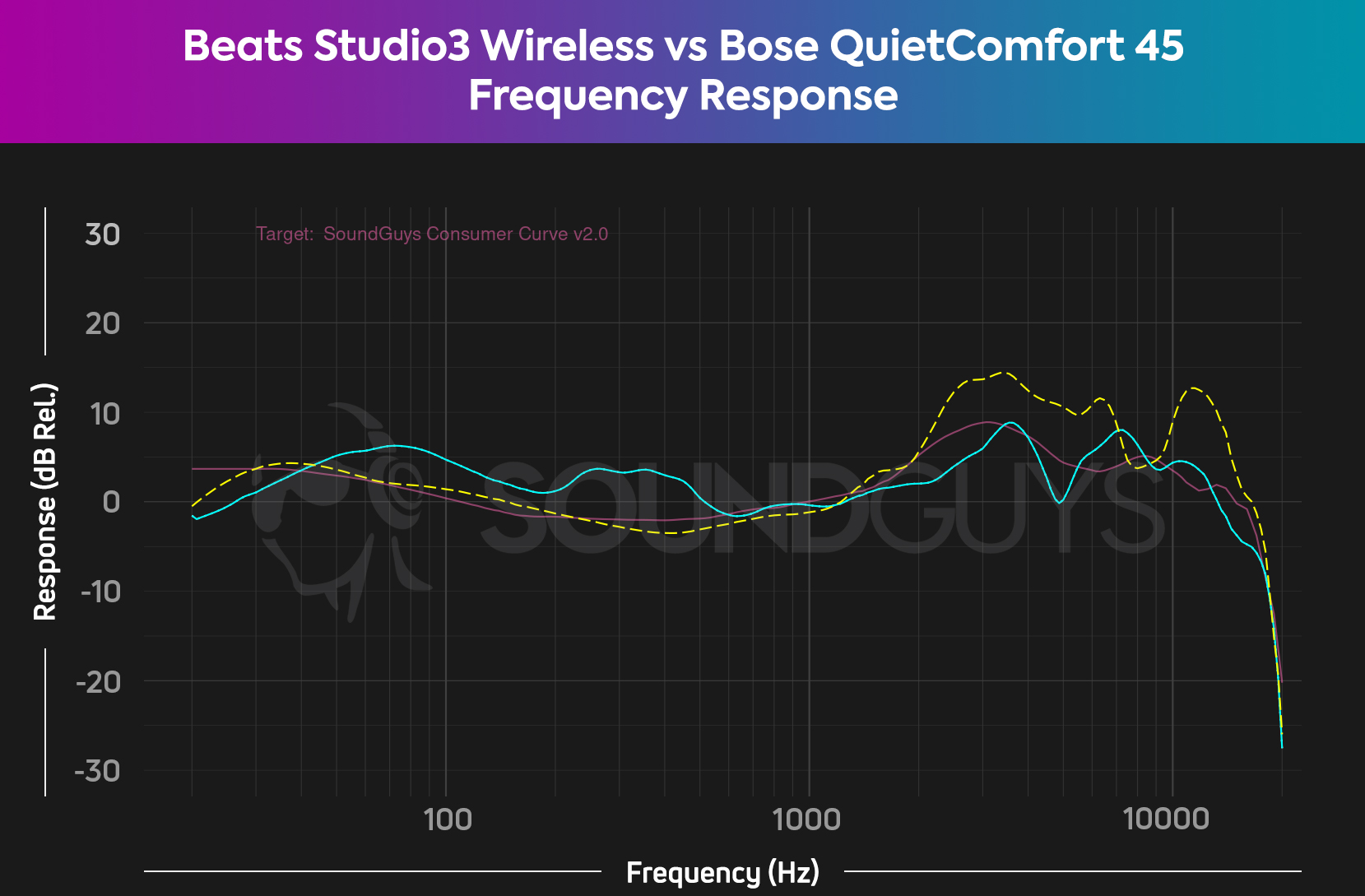
As you might expect, the Studio3 Wireless sounds fairly bass-heavy. Relative to the Bose QC 45, the Studio3 Wireless reproduces less deviation across the entire frequency range, and the treble notes are more pleasant. Still, the Bose QuietComfort 45 hews far closer to our consumer curve when it comes to bass and midrange notes; it’s just the treble response that tanks Bose’s sound quality score.
Does the Bose QuietComfort 45 and the Beats Studio3 Wireless have a microphone?
Both headphones have built-in microphones, and the Bose QuietComfort 45 is a bit better than the Beats Studio3 Wireless in ideal conditions. The gap widens between the two headsets when you compare their microphones in windy conditions (Bose wind microphone demo; Beats wind microphone demo).
Beats Studio3 Wireless ideal microphone demo (Ideal conditions):
Bose QuietComfort ideal microphone demo (Ideal conditions):
Beats Studio3 Wireless ideal microphone demo (Windy conditions):
Bose QuietComfort ideal microphone demo (Windy conditions):
How does the sample sound to you?
Should you buy the Beats Studio3 Wireless or the Bose QuietComfort 45?
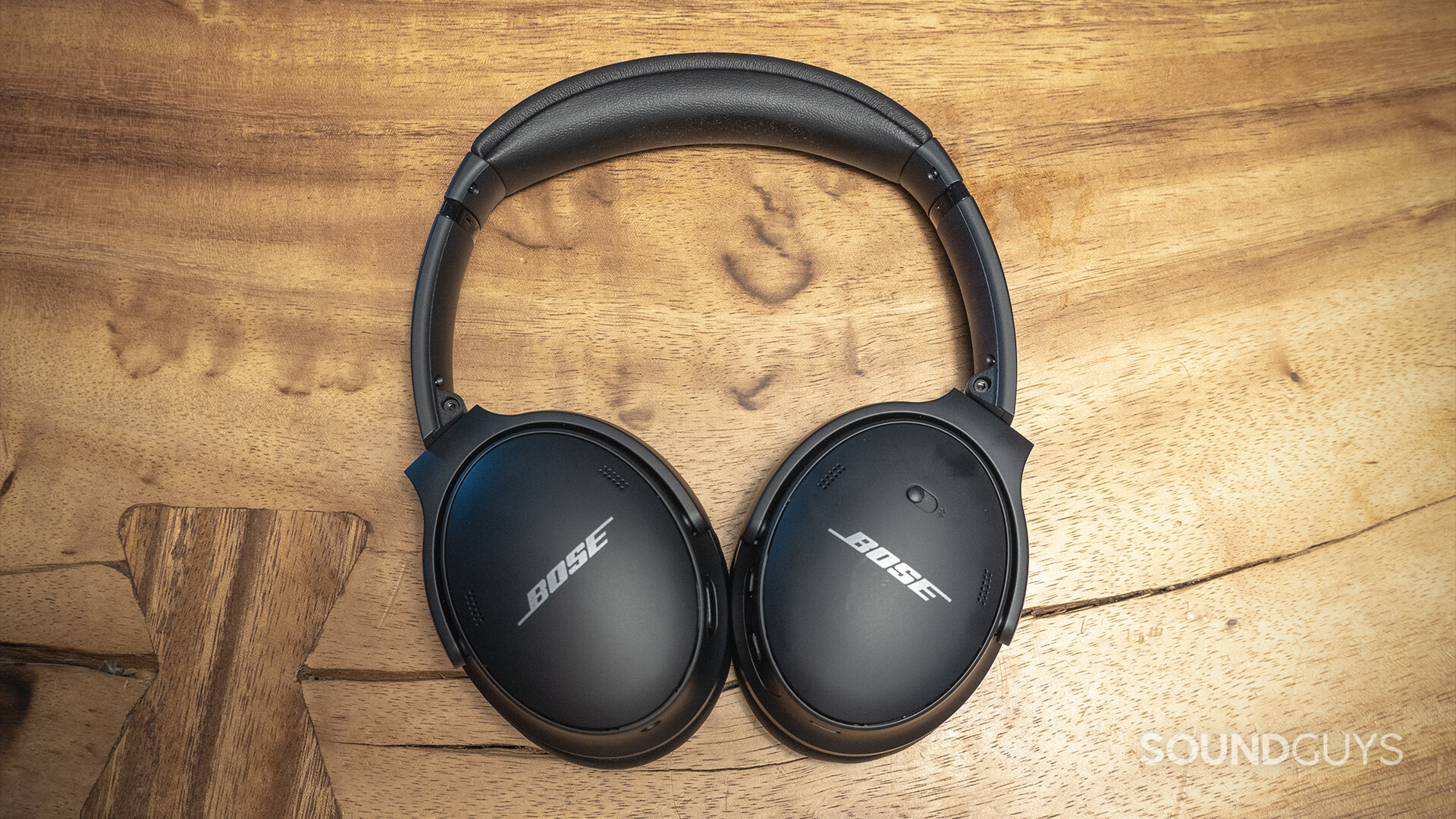
You’ll have to dig deeper into your pockets if you value the superior noise canceling and comfort of the Bose QuietComfort 45. If you’re a bass head, however, you’ll generally favor Beats headphones. Keep in mind that only the QC45 offers an in-app EQ. For the Beats Studio3 Wireless, you’ll have to turn to third-party EQ apps if the sound profile doesn’t align with your taste in music.
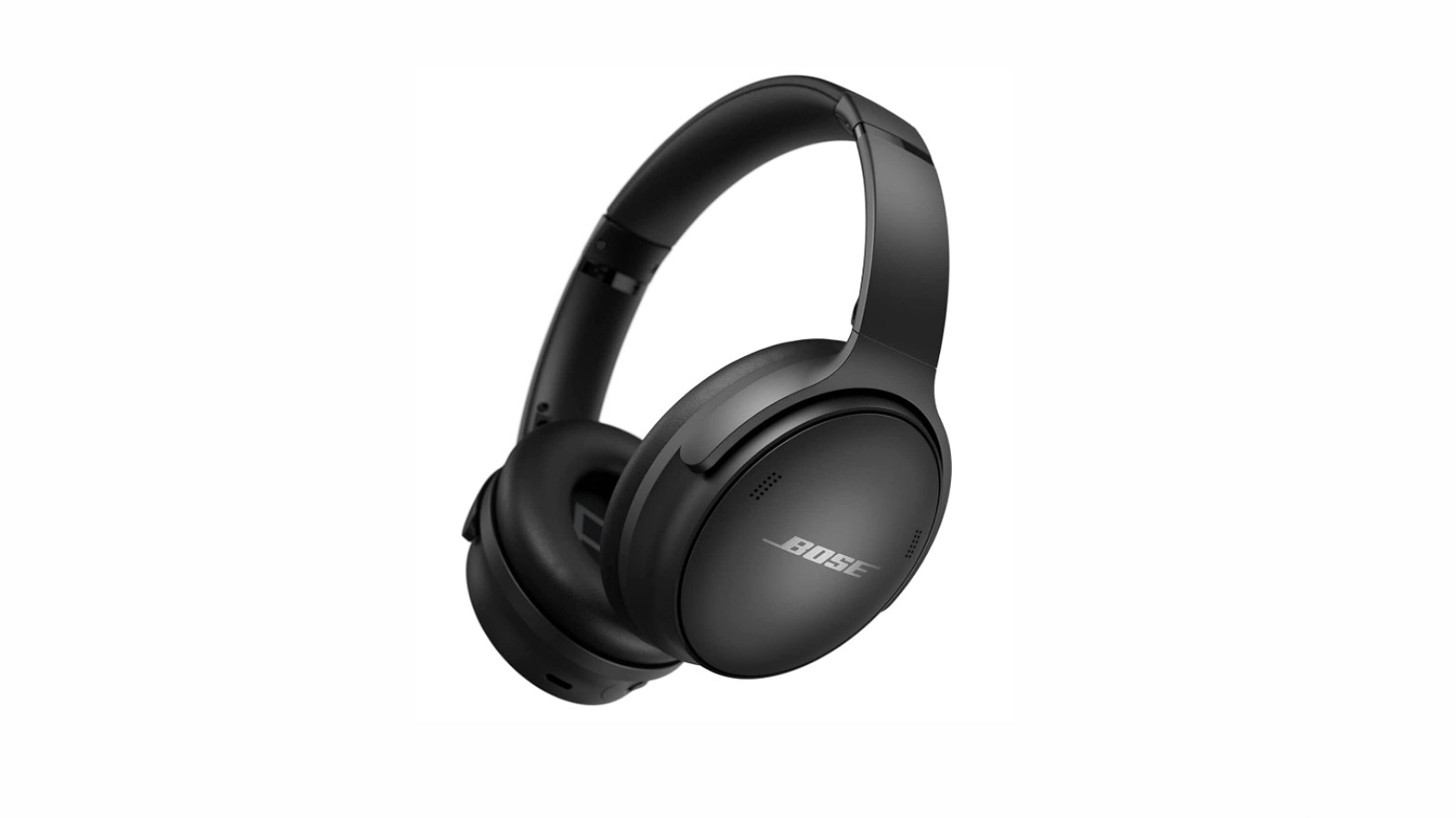
The QuietComfort 45 has slightly better battery life with the ANC turned on. But since you can’t turn the ANC off, you also can’t make the juice last much longer. With the Studio3 Wireless, you can choose between ANC or extra-long battery life.
![Beats Studio3 Wireless[whitebackground] The Beats Studio3 Wireless headphones in black against a white background.](https://www.soundguys.com/wp-content/uploads/2018/10/Beats-Studio3-Wirelesswhitebackground.jpg)
As an Apple user, the Studio3 Wireless W1 chip might win you over, but the micro-USB charging port might lose you again. Android users and audiophiles should look for entirely different headphones, as there’s nothing you want here.
What are alternatives to these Beats and Bose headphones?
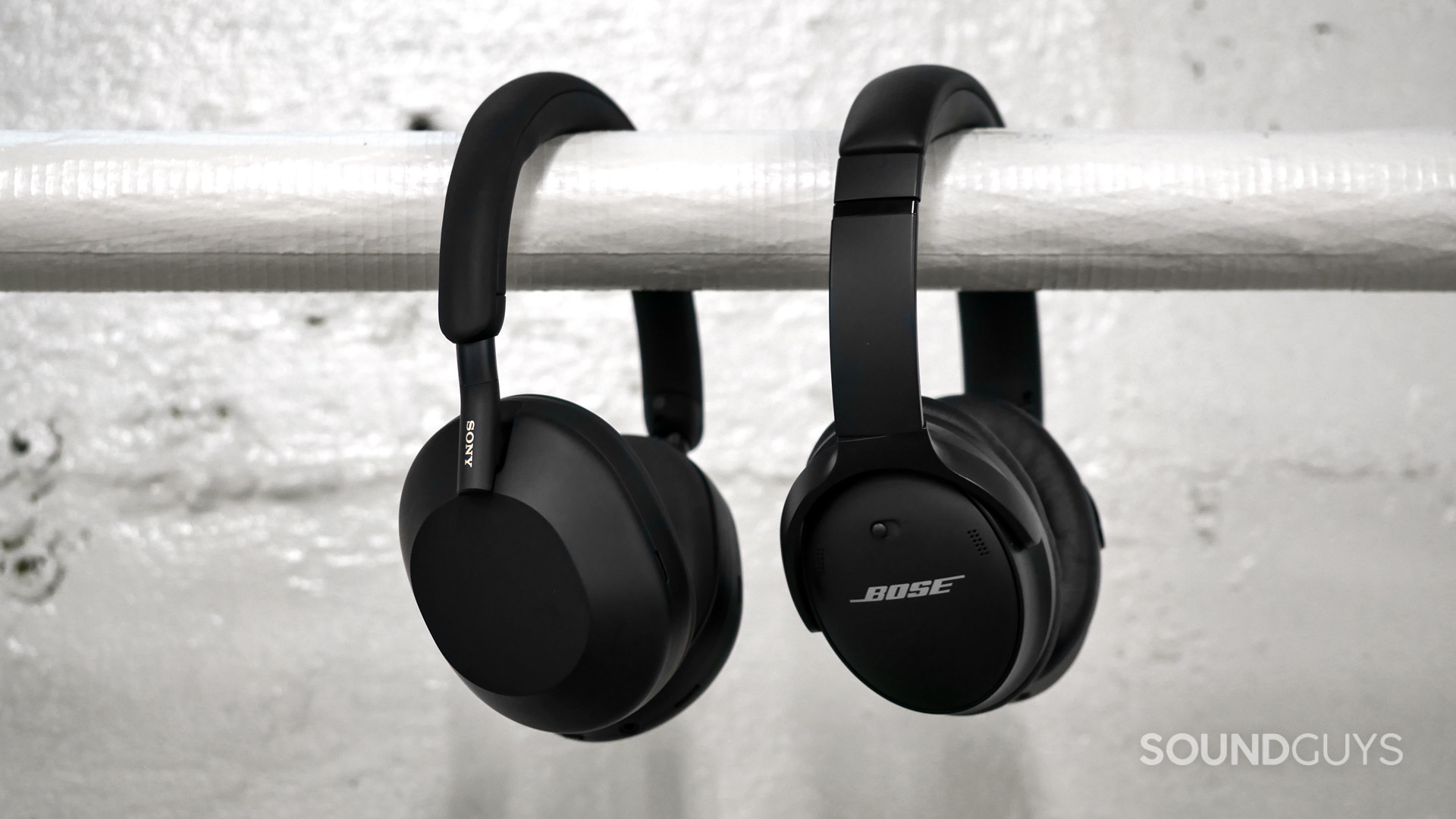
Audio enthusiasts expecting great sound and great noise canceling should consider investing in the Sony WH-1000XM5. With its improved sound quality and ANC, compared to the Sony WH-1000XM4, Sony’s new flagship is the best pair of noise canceling headphones you can currently get.
However, despite new features like Find My Device and Fast Pair, the price for the Sony WH-1000XM5 might be outside your budget. In that case, the Sony WH-1000XM4 remains a sound alternative as well. It doesn’t offer an ideal sound profile, but the equalizer in the Sony Headphones Connect app can make up for any deficits, whether you’re looking for studio sound or something much less neutral.
In terms of codecs, the Sony WH-1000XM5 and the WH-1000XM4 are equally good for Apple and Android handset owners, as both support SBC, AAC, and Sony’s own LDAC. Unfortunately, Sony’s Headphones Connect app forces you to use AAC rather than LDAC for Bluetooth multipoint on Android.
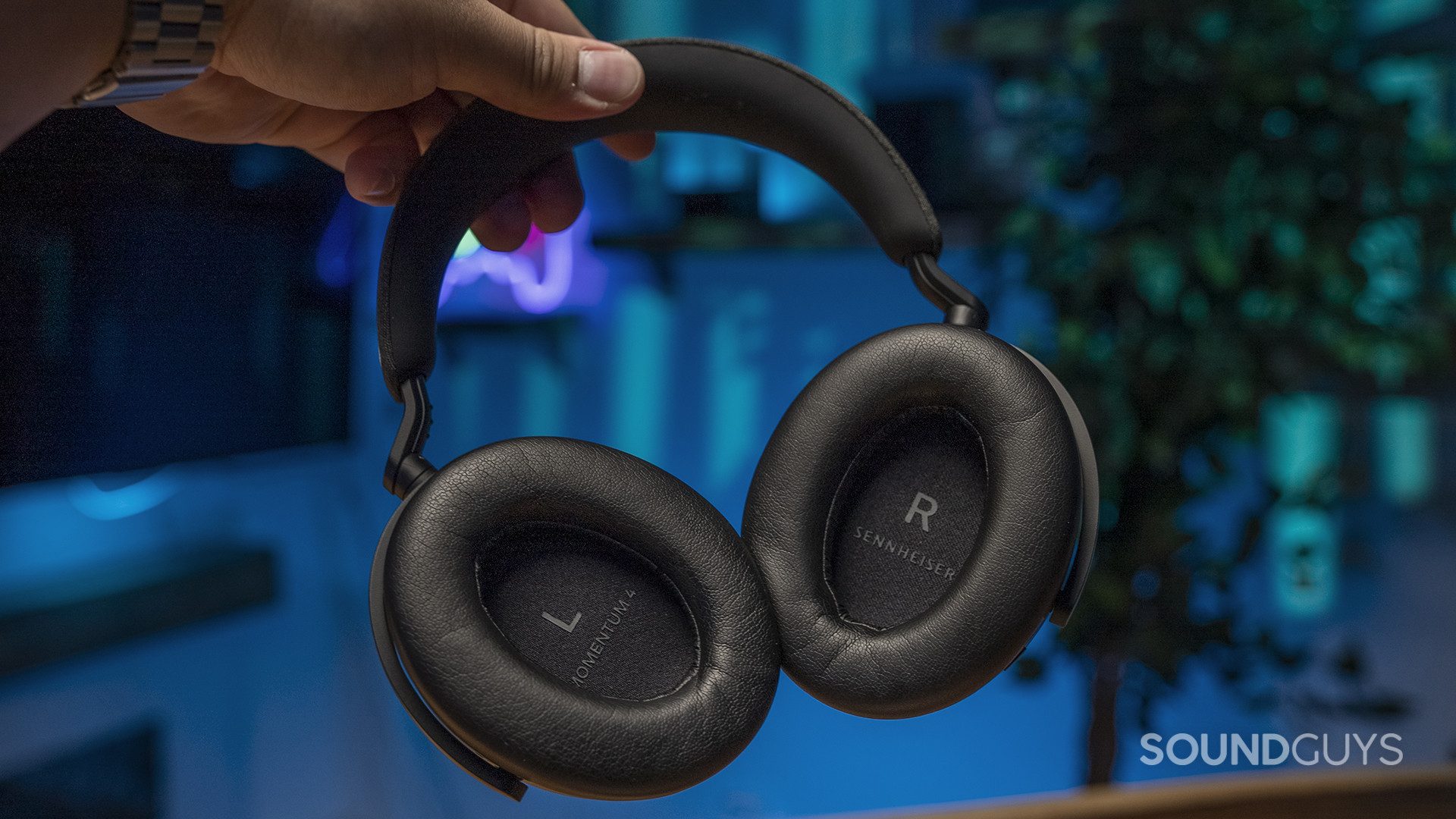
Android users should look into the Sennheiser MOMENTUM 4 Wireless, which supports SBC, AAC, aptX, aptX HD, and apctX Adaptive codecs. While the MOMENTUM 4 Wireless’s ANC can’t keep up with the Bose QC45, it does get you more than twice the battery life and better default frequency response.
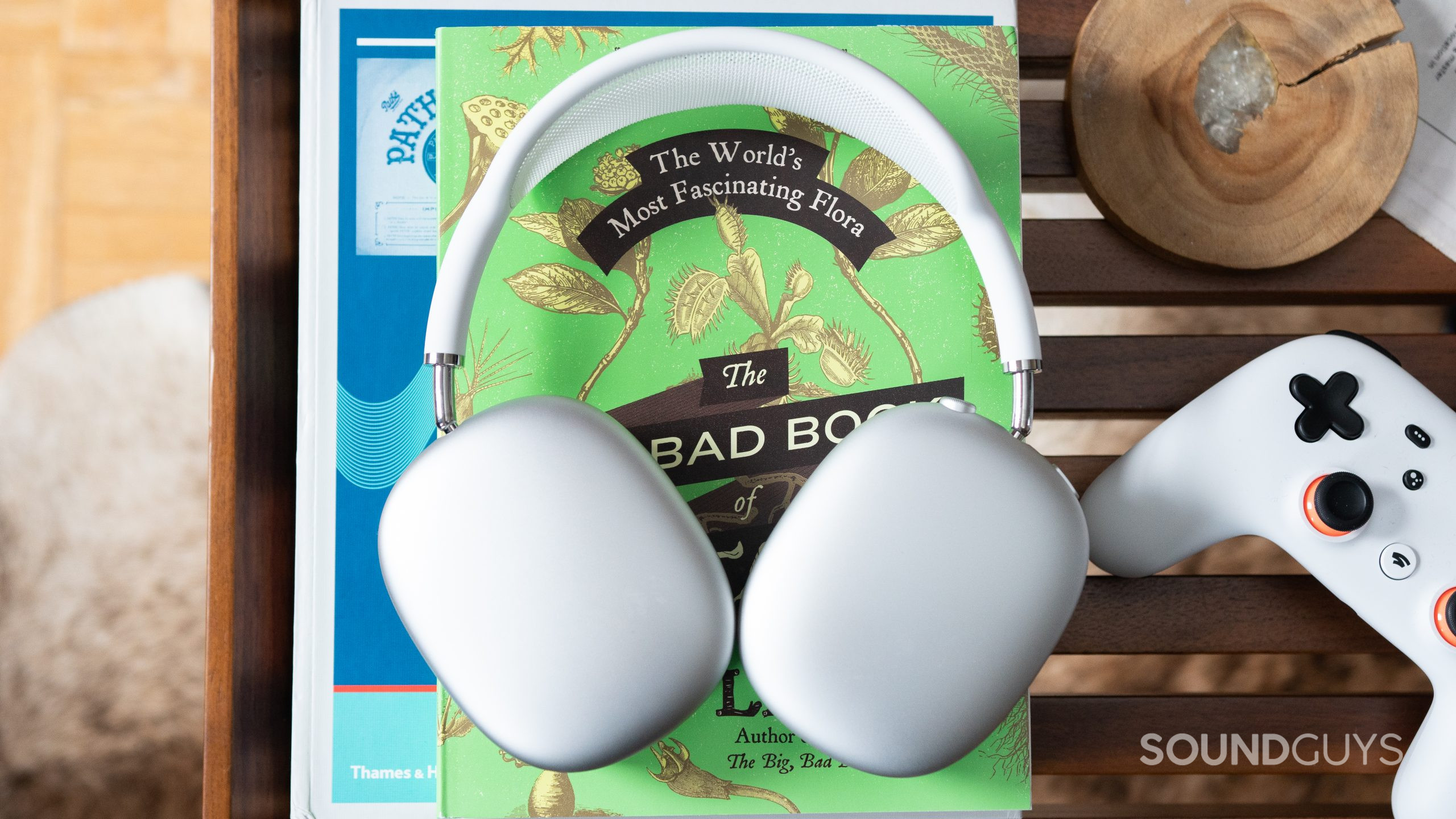
Apple users not satisfied with either of the options above should look no further than the Apple AirPods Max. The H1 chip guarantees smooth pairing and a stable connection with Apple devices. The noise cancelation is the best in the business and renders low and midrange sounds one-eighth as loud as they’d be without the headset. Even the sound quality is close to what we consider perfect, so you shouldn’t miss the non-existent equalizer.
Of course, the downside to all this excellence is the price. At 20 hours, the AirPods Max also doesn’t have great battery life, though you can turn the ANC off to squeeze out a few more hours. Since the AirPods Max doesn’t have an audio port, you can’t easily fall back on wired mode unless you purchase a Lightning-to-3.5mm audio cable for the headphones and a Lightning-to-3.5mm dongle to connect it to your iPhone.
Frequently asked questions
The main differences between the QuietComfort 45 and the QuietComfort 35II are battery life and ANC quality. You’ll get 3.5 hours more playback time with the QC45, as well as better passive isolation and noise canceling. Whether these improvements are worth the added cost compared to the QC35II is up to you.
Nither headphones have a water resistance rating, so you wonèt want to sweat a lot in them. However, the Bose QuietComfort 45 is more comfortable for extended wear and has better noise cancelation, which could be beneficial during workouts.